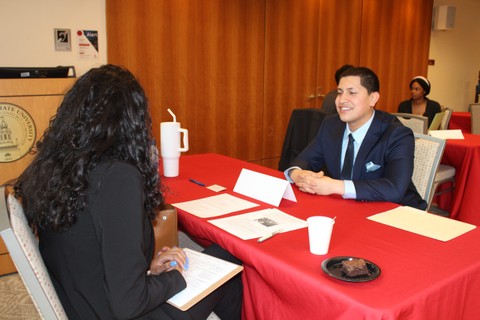Careers in Government
Working in the Federal Government requires a demonstrated interest in serving the public. Within the vast public sector, there are numerous areas where diverse interests and skills can be put to good use. It’s essential for individuals to have a clear direction in mind when considering federal-level careers.
- Executive Branch:
- Most administrative agencies, ranging from the Department of Agriculture to the Department of Veterans Affairs, fall under the Executive Branch. Even the Department of Justice, despite its name, operates within this category.
- If you’re interested in these agencies, your primary resource for job opportunities will be USAJobs.gov, where federal positions are posted.
- Legislative Branch:
- Working in the Legislative Branch entails a decentralized job search process. Each senator and member of Congress has their own hiring process and timeline.
- To explore opportunities, visit the websites of individual senators and representatives. Additionally, keep an eye on the House and Senate employment bulletins.
- Opportunities within the Legislative Branch extend beyond elected officials. Consider roles in House or Senate Committees, as well as positions in legislative agencies like the Congressional Research Service, Government Accountability Office, and the Library of Congress.
Remember that your focus—whether on a particular population, service, or agency—will guide your career goals in the federal government. Be sure to check out the Federal Resume tips on USAJobs.gov and consider some of the following college-level entry programs:
- Pathways Internship Program
- Federal Career Intern Program
- Presidential Management Fellowship (PMF) – Master’s & PhD level
- Volunteer Programs
State & Local
Local government plays a vital role in the daily lives of citizens. It encompasses a range of responsibilities, from managing public services to addressing legal matters. For individuals seeking to make a difference in their communities, local government jobs provide excellent opportunities.
State and local government careers offer employment options at various levels—city, county, and state. Here are some key points about these roles:
- Diverse Roles: Local government jobs cover a wide spectrum of responsibilities. These roles ensure the smooth functioning of public services, adherence to ordinances, and proper management of legal documents.
- Local Government Managers: These professionals oversee day-to-day operations within cities or municipalities. They work closely with elected officials and departments to ensure efficient service delivery. Coordinating with city councils, they implement policies, manage budgets, and address public needs.
- Responsibilities: Responsibilities of state and local government careers can range from managing public facilities and services, such as schools, parks, and medical facilities, to administrative assistant duties, handling legal documents, and responding to public inquiries. Public administration is a crucial aspect of these careers, ensuring the delivery of services, adherence to legal procedures, and effective management of resources.
- Public Administration: A critical aspect of these careers is effective public administration. This ensures the delivery of services, adherence to legal procedures, and efficient resource management.
In summary, local government jobs provide an avenue for dedicated individuals to contribute to their communities and play a vital role in shaping the lives of citizens.
Politics
Whether it is working for a political party, a politician, a candidate, or the advancement of a particular issue, there are many opportunities to get involved in politics. Political work includes people from a wide variety of backgrounds, including IT, creative writing, media, film, and more. Examples of roles include: Campaign Staff, Special Interest Advocate, Lobbyist, Speech Writer, Legislative or Congressional Aide, Public Opinion Analyst, Legal Aids, and elected officials.
Advocacy
If you aspire to shape decisions within political, economic, and social systems, and seek concrete outcomes, consider a career in advocacy. Community development or advocacy groups champion specific issues or concerns, and roles in this field often span law, public relations, and communications.
Criminal Justice
There are many career paths for students interested in pursuing a career related to Criminal Justice. Here are some of the examples of pathways:
- Law Enforcement/Security Careers: A Criminal Justice degree provides a deep understanding of the functions and dysfunctions of police, enabling graduates to pursue roles as police officers, detectives, or security professionals.
- Courts/Legal Careers: Majors learn about theories of criminal behavior and gain insights into the workings of the court system. Graduates can explore careers as paralegals, legal assistants, or court administrators.
- Corrections/Rehabilitation Careers: Understanding the correctional systems, graduates can work as correctional officers, probation officers, or rehabilitation counselors.
- Teaching/Research Careers: With knowledge of social science measures in criminal justice, graduates can contribute to academia, research, or teaching in the field.
Law
Law School and Career Paths: Many students interested in law pursue law school. Let’s explore some career paths you can follow with a law degree:
- Judges:
- Judges preside over federal, state, or municipal courts. They apply US law and have the authority to issue new rulings on previously unaddressed issues.
- Students aspiring to be judges often intern or work with lawyers or judges and then apply to law school.
- Lawyers (Attorneys):
- Lawyers serve as advocates and advisors within our legal system. They represent individuals, corporations, companies, or government entities.
- Their roles include advocating for clients’ rights before administrative and government bodies, as well as providing legal counsel for personal and business matters (such as property transactions and wills).
- Students interested in becoming lawyers typically gain experience by interning or working at law firms before applying to law school.
- Practice Areas:
- Lawyers specialize in various practice areas, including:
- International Law
- Criminal Law
- Business Law
- Labor Law
- Public Law
- Constitutional Law
- Corporate and Commercial Law
- Family Law
- Media Law
- Lawyers specialize in various practice areas, including:
- Non-JD Careers:
- Not all legal careers require a Juris Doctor (JD) degree. Some options include:
- Paralegals: Paralegals (legal assistants) assist with trial preparation, research, and legal document preparation. Their duties vary based on the law firm. Students interested in this path can intern or work at law firms and may pursue paralegal certification (though it’s not always required).
- Mediators: Due to the rising cost of legal counsel, more individuals are hiring mediators. Mediators facilitate negotiations, settlements, and advice, helping conflicting parties find common ground. Mediators also prepare court reports and social case histories.
- Not all legal careers require a Juris Doctor (JD) degree. Some options include:
Remember that a law degree opens up diverse opportunities beyond traditional legal practice.
Career Resources:
- http://www.gogovernment.org/
- https://www.careersingovernment.com/tools/blog/state-and-local-government-careers/
- https://www.govtjobs.com/
- https://pac.org/jobs
- https://www.workforgood.org/jobs/civil-rights-advocacy/
- https://hillzoo.com/
- https://www.findlaw.com/legal/law-students.html
- https://www.idealist.org/en
- https://www.careerprofiles.info/criminal-justice-careers.html

















